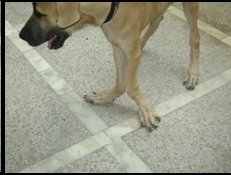There are many nutritional myths perpetuated on the internet. The internet is a great way for companies to dissuade consumers from using a competitors foods and try to move the customer over to their product line. I am always amazed at what lengths these companies will go to in order to give their product a leg up. For me, it is more important that my readers know the truth, then they can make an education decision about how they want to feed their pets.
The past 15 years we have seem major changes in the quality of pet foods available to the consumer. But the past 10 years of pet food recalls and the sales of companies that we depended on, has left the consumers not knowing who to trust and what to believe.
We have companies that make kibbles (grocery store level, premium, super premium, natural and holistic) or dehydrated raw diets, totally raw diets or homemade diets. There have been several new books about making a homemade diet, some are not based in nutritional science, just recipes, so I am hesitant to recommend this route because of all the problems I have seen when pet owners try to make their own foods. It is particularly a problem when trying to feed large/giant breeds or homes with multiple animals. Then it is a monumental task to make a homemade diet. This usually results in falling into the same routine and not offering a variety of foods to get the vitamins/minerals needed for a complete diet.
The biggest problem with homemade diets is no one does the math in balancing the important calcium/phosphorus ratio along with magnesium and supplying the often missing trace minerals necessary for all of it to work together. The mineral composition of a food is developed on a "matrix" system and when you move one mineral it means an adjustment to all the minerals that are interconnected.
It is also a very different problem if you are feeding several dogs or are a breeder/kennel with large and giant breeds. They are generally not going to cook for a kennel of dogs. The whole point of making homemade diets is to be able to control to some extent, the quality of ingredients of the diet, and yet there are some exceptional companies (1) that make dehydrated balanced diets or totally raw diets (2) that are nutritionally balanced and they have done all of the work for you. I have found most small breed dog owners are the ones that attempt a homemade diet - yet when I ask them "what the calcium and phosphorus percent per lb and what the ratios?" and the answer is always the same... they have no clue. They do not even know the importance of balancing their mineral compositions, and have no clue what is missing in terms of vitamins.
Like it or not, commercial dog foods regardless of quality do use a balanced vitamin mineral premix on their foods - by law in the USA, they have to, just like baby foods must be balanced in calcium/phosphorus ratios. So even the worst food on the market have a proper calcium/phosphorus ratio - who knows what the quality and bioavailability may be, but the calcium phosphorus ratio will be correct. If you think this is not a critical issue, here is an example of a dog from that was fed a homemade diet of primarily rice and vegetables both foods high in phosphorus low in calcium.


On tiny breeds this kind of imbalance shows up when the dogs start to become paralyzed and dragging themselves around with no use of their rear legs because the body needs calcium for organs and blood and it will take from the bone to run the rest of the body. So this relationship between calcium, phosphorus and magnesium and trace minerals is very important for proper growth and wellness.
There are several raw pet food diets who have build a company based on their philosophy that dogs do not have an important enzyme in their body that allows them to digest carbohydrates. This seems illogical to me and has for years, because of their adaptability over the past 33,000 years in which canines have been attached to mankind. They have lived off the left over of human food, cooked and raw as well as what they managed to scavenge or hunt. This whole school of thought has spawned the new "grain free" market of pet foods. When in fact there is research that shows real working, sled dogs and hunting dogs perform best with a meat based diet and a carbohydrate source from "quality grains", natural, whole grains that are nutrient–rich and unaltered - examples: brown rice, oats, quinoa, amaranth. How can these be good as a carbohydrate source be when we are told by raw food companies that dogs do not make the enzyme AMYLASE which allows the body to process carbohydrates.
Dr. Elliott Harvey has done research in this area and addresses this issue in his article: Grain to Provide Storage Glycogen As Dr. Harvey states "Every athlete knows that taking in pasta or grain loading prior to an athletic event, provides the necessary storage glycogen for the athlete to have sufficient glucose for muscle performance for the duration activity. This glucose is necessary for all muscle function."
Harvey goes on to talk about the value of whole grains, precooked and/or freeze dried grains in a diet. The key is the diet should NOT be grain based, but instead should be based in protein from quality meat sources. Now it is true that dogs get their energy levels from fat more than grains. And a blend of fats in a food is very important due to the levels at which they are burned. This is critical for performance dogs in particular. Some component of whole grains are vital in a food in order to have proper insulin and glucose function especially when they are performing/working.
Dr. Harvey says "Some dogs do well on a completely grain-free diet, and some dogs do better with grains, in fact, in my experience; many, many dogs improve dramatically when using our Canine Health Food (which has a whole grain component) with raw or cooked meat".
Dr. Harvey goes on to point out, "Nature made all muscle and brain function (99%) using glucose and oxygen. Carbohydrates, such as grains, are stored in the liver as glycogen, this is then released as glucose in the blood as the body requires it". "I see that dogs do incredibly well and thrive on 6-10% grain in their diet. Dogs are able to utilize the glucose from grains, as athletes do when they are performing" (3)
Dr. Harvey's company is not the only company to have found this out in their research feed trials. PHD - Perfect Healthy Diet now called Vivand, has also put whole grain back into the dry food because the dogs in their research and feed trials did not maintain stamina when working and lost weight quickly, having difficulty in maintaining their ideal weight when they were working or active dogs.
The QUALITY of the grain used, the AMOUNT and KIND of grain is the key!! - remember whole intact grains have all the fiber (intact) so it is not a fast burn as is refined carbohydrates. Whole ground oats have Oat Beta Glucans present - an anti cancer component and Brown Rice has Rice Bran intact which is one of the strongest detoxifying agents and antioxidants available. So it's important not to throw the baby out with the bath water. Grains as a carbohydrate source do have their uses in your pet's diet and are not the enemy as often promoted by some pet food manufacturers.
Recently I attended the Global Pet Expo Trade show and had lunch with a friend from Finland who is in the field of Nutrigenomics reseach . He was discussing the latest research findings from the University at Uppsala Sweden, on the ability of dogs to digest grains. It was his feeling that grain free diets are not necessarily the answer for all dogs or feeding situations.
Upon my return I was pleased to see the article by Mary Straus in the latest March 2013 Whole Dog Journal where she discusses in length these same research findings. I have never been one who totally bought into the notion that canines MUST be fed a totally raw diet or a diet that is without grains, because I understood the power of adaptation within our breeds.
For years I have proposed that as long as dogs have been interacting with humans (33,000 yrs) they have adapted to eating anything and everything (but the kitchen sink) in order to survive. As scavengers living along the campsites of nomads, to living on the edge of the cities and garbage dumps, dogs have learned to survive by eating raw, cooked, spoiled foods as well as feces. So for me it is not so much the issue of whether or not they should eat grains, but a matter of “can they eat grains” and utilize them properly as well as which grains benefit them more than others do nutritionally. I always try to look at all the facts before I determine what is best for each dog whether it is a very high quality kibble , grain free kibbles, dehydrated or totally raw....each has their place, it is not an either or issue for me.
First let’s look at a quote by Mary Straus in her excellent article.
“Kerstin Lindblad-Toh, a geneticist at Uppsala University in Sweden, led the team that looked at the genetic differences between the genomes of 12 wolves from around the world and 60 dogs from 14 different breeds. They found 36 areas in the genome where dogs differed from wolves, but not from dogs of other breeds. This indicated changes likely linked to domestication. Nineteen of the regions found involve the brain, and 8 of those are involved in the nervous system development that could help explain behavioral changes that made dogs friendlier, less aggressive toward humans. Another 10 genes were found to help dogs digest starches and break down fats."
"The researchers believe that 3 genes in particular make dogs better at splitting starches into sugars and then absorbing them into the gut. Interestingly, most humans have also evolved in the ability to easily digest starches in what appears to be a case of parallel evolution. This adaptation is linked to the development of our agriculture about 10,000 years ago. “
In my conversations over the years with the caretakers of Wolfpark Preserve at (Purdue University) we know that wolves do best fed primarily deer carcasses and do not digest carbohydrates well at all. In contrast, dogs can digest starches which is evidenced by their ability to use diets that contain grains over the past years. Again grain based foods are not good, but a high quality grain component works very well. People think it is the grains that causes allergies, when in fact it is the lack of variety in a diet (feeding the same kibble over and over) and the lack of the addition of fresh human foods with their enzymes intact (fruits/berries/ dehydrated or raw meats). To insure there are adequate living enzymes in a diet to detoxify the body these supplements that can be added back to your pet's kibble or diet very easily. By doing this supplementation it provides critical "living dietary enzymes" back into their system that replicate the living component in the wild . (4)
The University of Sweden study says “ Our results indicate that novel adaptations allowing the early ancestors of the modern dogs to thrive on a diet rich in starch, relative to the carnivorous diet of wolves, constituted a crucial step in the early domestication of dogs.”
I agree with Mary Straus in that I do not believe a diet high in starchy carbohydrates is appropriate for today’s dogs and this means grocery store level foods are not the ideal choice. Any commercial food that is grain based is not appropriate and in my opinion not in the best interest of the dog's wellness. So if you are inclined to use a kibble use only holistic commercial dog foods. I have a list of better kibbles on my website www.GreatDaneLady.com - Just type in Criteria for List of Better Foods in the search box.
A high carbohydrate diet in humans and pets may explain the similarities in certain diseases that are on the rise such as diabetes, inflammatory bowel, systemic yeast overgrowth, allergies and cancer, these indicate there may be problems with eating diets high in starchy process carbohydrates. I feel diets for canines work best if they are based in multiple meat based proteins, with a 10%- 16% fat (higher for true working dogs), with a carbohydrate component that includes fruits, vegetables and healthy whole ground grains.
When I consult with pet owners and veterinarians about a pet's diet, I look at each case individually and determine what type of diet is best for that pet, be it a holistic kibble, a raw diet, dehydrated raw or a combination of these methods of feeding.
As for grain free diets, I feel those with a white potato based carbohydrates source are worse for allergies, systemic yeast infections, diabetes and cancer, than a quality whole ground grains component used in the proper proportion in a meat based kibble.
The latest research in Europe using sled dog performance shows us that true performance dogs have no stamina on grain free formulas, they tend to run hot, fast, then blood sugars plummet. What works best for these performance dogs is a meat based diet from multiple protein sources (from meats, not protein from peas or potato), moderately fat diets and then as a moderate carbohydrate source including a blend of oats/brown rice OR oats/corn (high quality/low gluten corn) in order to sustain high energy performance levels. It has been shown that with a quality intact ground grain, low carb component, that the animal is better able to balance the insulin and glucose levels, especially when the dog is working. To date there is no real research done on grain free diets.
The Blackwatch Feed Program has a 30 year history of success. I use a holistic kibble (Precise Brand) and actually rotate between a meat/grain based kibble and meat/no grain based kibble. Then I provide variety by using 10-20% component of Honest Kitchen dehydrated raw or 10% commercially prepared raw diet such as Darwins or Primal. I also switch it up with come holistic balanced canned meat as well. Every meal contains Probiotics/Digestive Enzymes (combination product) (6) and a Dietary Enzyme (4) supplement to put the living back in what is cooked or processed.
This is where my Blackwatch Core 4 Philosophy of feeding my pets has come in all these years. My CORE 4 Philosophy of Feeding is the basis for all the Blackwatch Feed Program that has been used now for over 30 years by many breeders and owners of a variety of breeds (For detailed information go to my website and type in CORE 4 in the search box).
_________________________________________________________________________________
RESOURCES:
(1) The Honest Kitchen Dehydrated Raw and Answers Dehydrated Raw Diets
(2) Darwins Raw Diet, Primal Raw Diet, Northwest Naturals Raw Diet
(3) For more information on this diet go to: http://www.drharveys.com/
(4) Nzymes Granular, Dismutase Granular, PhytoSprouts Plus - available at www.FirstChoiceNaturals.com - 765-284-8288
(5) Holistic Kibble Resources: Precise Natural Line, Precise Holistic Complete Line - www.precisepet.com
Overseas Precept Plus- http://www.preceptplus.co.uk/ and http://www.kodopetfood.eu/
If these are not available to you I have a list of better foods at my website listed under Criteria List for Better Foods

